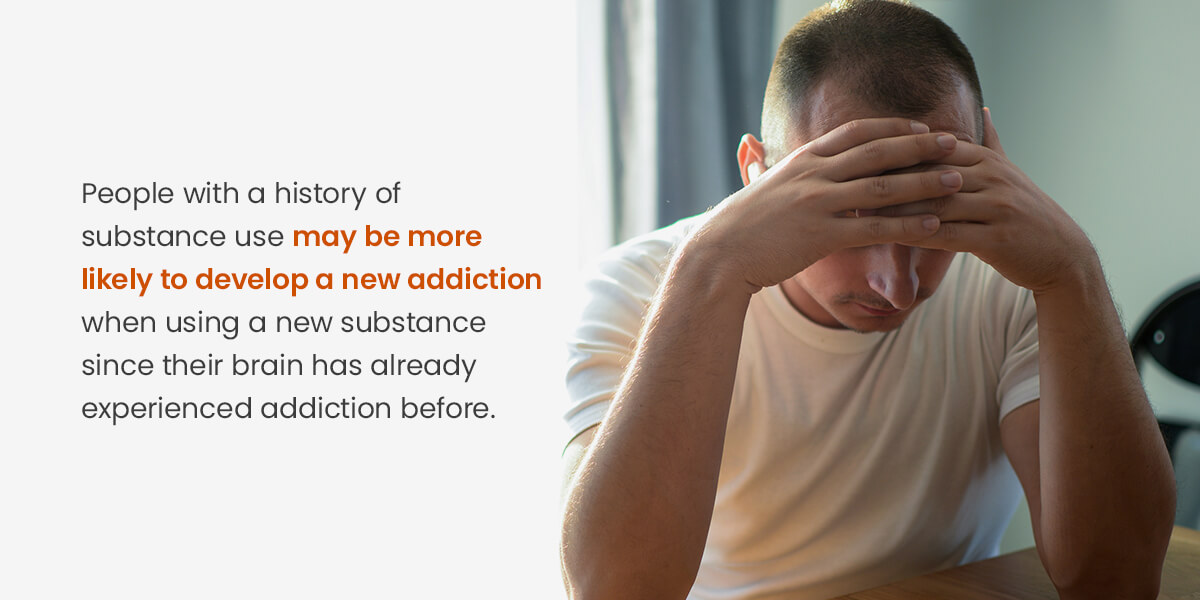I Only Do Meth on the Weekends — Am I Addicted?
Methamphetamine, also known as meth, is defined by the United States government as a Schedule I substance, meaning that it has a high risk for misuse and addiction and has no accepted medical usage. Meth can be taken in various ways, including intravenous or intramuscular injection, smoking, snorting or orally. A person will feel an intense rush of pleasure after taking meth, but it quickly fades away and cause agitation. In some cases, the agitation can lead to erratic behavior until a person can use the substance again.
While many start experimenting with meth or using it on specific occasions, experimental or occasional use can quickly evolve into dependency and addiction. Once a person becomes addicted to meth, it can significantly affect their quality of life, including their physical, mental and emotional health. Below, you’ll learn more about the effects of methamphetamine addiction, how to notice the signs and when to seek treatment.
Table of Contents
- The Long-Term Effects of Prolonged Meth Use
- Why Meth Use Always Becomes More Frequent Than You Planned
- Dangers of High-Functioning Meth Addiction
- Signs of Meth Addiction
- Signs of Withdrawal Symptoms
The Long-Term Effects of Prolonged Meth Use
Addiction is one of the primary long-term effects of prolonged meth use. Addiction is a life-long disease characterized by the compulsive use of a substance that alters the function and molecular structure of the brain. A tolerance to methamphetamine occurs when taken repeatedly, and people who abuse this substance will need to take higher doses or change their administration method to achieve the desired effect.
People who use meth for extended periods may experience challenges feeling pleasure from anything besides their substance use, which fuels addiction. On top of addiction, methamphetamine use has other adverse long-term effects, including:
- Intense anxiety
- Insomnia and other sleep disturbances
- Mood disturbances
- Confusion
- Violent behavior
- Hallucinations
- Paranoia
- Cardiovascular or cerebrovascular dysfunction
- Psychosis
Some symptoms, including psychosis, can last for months or years after a person stops using the substance. These symptoms of long-term methamphetamine addiction show that the drug can cause significant changes in the brain. Meth use can also cause changes in the brain associated with memory and emotion, which can cause challenges in learning and create emotional and cognitive difficulties in individuals. The effect on the dopamine system can also cause problems with motor functions.
A person who uses meth long-term also has to be careful of overdosing. As you build a tolerance, you’ll need more of the substance to achieve the same effects, which could pose the risk of choosing a dose that is too high. Some overdose effects include:
- Extreme sweating
- Dilated pupils
- Hyperthermia
- Multiple organ system failure
- Heart attack
- Stroke
- Coma
Overall, meth significantly impacts the central nervous system, which can drastically affect a person’s quality of life. Long-term methamphetamine can weaken a person’s physical, mental and emotional health, affecting their lives as the addiction worsens without treatment. The risk of overdose can also become fatal if a person doesn’t receive the help they need, or they’re not carefully monitoring their doses.

Why Meth Use Always Becomes More Frequent Than You Planned
Even if someone starts just using methamphetamines on the weekend, the drug is very easy to get addicted to. The pleasurable effects of meth make it more appealing to people who aren’t aware of the long-term effects or who believe that occasional use won’t lead to an addiction. Some short-term pleasurable effects of methamphetamine use include:
- Intense happiness or excitement, also referred to as euphoria
- Reduced fatigue
- Wakefulness and boosted attention
Once the pleasurable feelings fade away, your brain will want to use the drug again to achieve the effect repeatably. People with a history of substance use may be more likely to develop a new addiction when using a new substance since their brain has already experienced addiction before. Additionally, people with a history of mental health conditions may have a higher risk of developing an addiction to self-medicate their uncomfortable symptoms.
Many people who struggle with meth addiction also have mental health conditions that contribute to their addiction. Some of these co-occurring conditions include:
- Depression and anxiety disorders
- Bipolar disorder
- Schizophrenia
- Conduct disorders
- Antisocial personality disorder
- Alcoholism or other substance use disorders
Even if you’re just using meth on the weekend, the nature of the drug will make even the most resilient person start to use the drug more. As someone uses the substance more frequently, they’re more likely to develop a tolerance and dependency, which can quickly evolve into an addiction.

The Dangers of High-Functioning Meth Addiction
People who have a high-functioning meth addiction are people who can hide their addiction from their loved ones, employers and other people in their lives. These individuals can seem successful, polished and put together, even under the influence. These people may be able to complete work tasks on time and keep their homes clean while maintaining their social relationships.
However, people don’t see that individuals with high-functioning meth addiction often spend late nights trying to catch up on their work or other responsibilities. The same tasks that can come easily to sober individuals will be more challenging when addiction takes over, but people with high-functioning addiction work hard to make it appear this way to those in their lives.
Despite having a high-functioning addiction, the mask often slips as they lose control of their addiction, which can put themselves and their loved ones at risk. High-functioning addicts often struggle to get by and endure adverse physical and mental health effects from substance use.
There are many dangers of having a high-functioning meth addiction, even if you don’t believe it’s affecting your life. Some of these dangers include:
- Declining health and well-being: The long-term effects of meth use can significantly affect a person’s physical and mental health. People who use this substance regularly, even if they’re experiencing high-function addiction, will experience worsening health and well-being. People may experience problems with their memory, impulse control and emotional stability, drastically affecting their lives and relationships.
- Risk of irreparable harm: Being high in many situations can be dangerous to yourself and others, especially if you have a job as a doctor, first responder, police offer or another profession where quick decisions are essential. Being high can also be dangerous if you work around hazardous materials, appliances or other materials. You could potentially cause harm to yourself or others, which can affect your job, reputation and health.
- Poor work performance: Using meth won’t improve your job performance, regardless of your job. Even people with high-functioning addiction can start to let their professional relationships and productivity decline to maintain their substance use. You can begin to miss deadlines, call in sick or show up late because you were under the influence and too inebriated to function. Over time, your work may see you as unreliable or untrustworthy, which could negatively affect your professional reputation.
- Financial or legal troubles: Affording an addiction is expensive, which can cause financial hardships for people struggling with substance use. Some people may look for alternative methods to afford their addiction, such as borrowing or stealing from friends and family or engaging in criminal activity to make enough to sustain their substance use. As someone develops a tolerance, they’ll need to use more, requiring more money. If someone engages in criminal activity to afford their addiction, it could result in legal consequences.
- Compounding effects: Addiction is a chronic disease that often worsens as a person continues using substances without help. A person’s health will start to deteriorate, and the consequences of substance use will begin to add up. Once a person’s dependency grows, it becomes more challenging to get sober. However, it’s possible to improve your life and reverse some of the effects of substance use by finding the proper support and treatment.
- Tense social relationships: Even if someone hides their substance use from their loved ones, people will often pick up on the changes a person experiences when they start using substances. Once your loved ones suspect substance use, your relationship with them can become tense, especially if they feel you’ve lied to them about your substance use. Turbulent social relationships can make dealing with addiction more challenging since support is vital in recovery.
Even if you only use meth on the weekends and think that your life hasn’t been affected by substance use, occasional use can quickly turn into regular use, which can turn into an addiction. Even people with high-functioning addictions can experience negative consequences that alter their quality of life.
Signs of Meth Addiction
Signs of meth addiction will vary based on a person’s genetics, method of use, dosage, frequency and if other substances or alcohol are being used simultaneously. Signs of meth addiction are split into behavioral, physical, mental and psychosocial symptoms. You could be addicted to meth if you exhibit the following symptoms:
Behavioral Symptoms
Meth addiction can change a person’s behavior drastically. Some of the behavioral symptoms of meth addiction include:
- Lying to loved ones to cover up substance use
- Hiding stashes of the substance around your home
- Withdrawing from activities you previously enjoyed
- Increasing criminal activity
- Finding a sudden need for money to sustain the addiction
- Stealing from loved ones, whether it’s money or things to sell
- Increasing violent behavior
- Participating in unsafe sexual practices
- Participating in reckless or risky behaviors
- Performing poorly at work, home or places where you have responsibilities
Physical Symptoms
Meth significantly impacts a person’s physical health, especially once a person has developed an addiction to the substance. Some of the physical symptoms of meth addiction include:
- Rotted teeth
- Decreased appetite leading to malnutrition
- Open sores around the mouth, arms, hands or chest
- Reduced need for sleep due to insomnia and sleep disturbances
- Faster breathing
- Brain damage
- Higher energy levels
- Strokes or seizures
Mental Symptoms
On top of the physical consequences of meth use, meth addiction can also affect a person’s mental well-being. Meth can affect a person’s cognitive abilities, making it challenging to function in society or facilitate learning. Some of the mental or cognitive symptoms of meth addiction include:
- Increased ability to focus while under the influence
- Thinking quickly
- Jumping from thoughts without logical progression
- Clouded judgment
- Challenges with concentrating on more than one thing at a time
- Memory loss
Psychosocial Symptoms
Finally, meth can also affect a person’s psychological and social health. People with a meth addiction may struggle to connect with others or maintain quality relationships due to their behaviors and mental health. Some psychosocial symptoms of meth addiction include:
- Irritability
- Euphoria
- Hallucinations
- Depression and anxiety
- Invincible feelings
- Suicidal thoughts and tendencies
- Worsening mental and emotional health conditions
- Psychosis

Signs of Withdrawal Symptoms
When someone stops taking methamphetamines, they’ll start experiencing withdrawal symptoms, but these will vary based on the frequency, duration and typical dosage of a person’s substance use. Withdrawal symptoms can last for days or weeks, depending on the severity of a person’s addiction. It’s essential for people trying to detox from meth to do so under professional and medical professionals to ensure they can avoid and manage many of their symptoms.
Meth withdrawal symptoms include:
- Intense cravings
- Anxiety and depression
- Sleep disturbances
- Excessive fatigue or sleepiness
- Irritability or agitation
- Restlessness
- Vivid dreams
- Hunger
- Suicidal thoughts or behaviors
If you’re trying to stop using meth to improve your quality of life, you should seek help from an addiction specialist. These professionals can arrange a treatment plan for you, including a supervised withdrawal program to help you manage your symptoms and reduce the risk of relapse.
During an addiction treatment program, you’ll participate in various forms of therapy and treatment to get to the root cause of your addiction and change your way of thinking to help improve your quality of life. You’ll likely also participate in a relapse prevention or aftercare program, which will help you develop the skills you’ll need once you finish your treatment and return to your everyday life.
These skills, such as journaling, yoga, exercise and socializing, will help you develop a new routine that doesn’t involve substance use. You’ll also create a list of people you can call when you feel stressed or close to a relapse. Some programs may even set you up with a sponsor, someone with experience in addiction and can be someone you can call on when you feel like you may relapse. These individuals have gone through addiction treatment programs and have made it through their own recovery, which can help you feel less isolated through your recovery journey.
Start Your Recovery Journey From Meth at The Sanctuary
Recovery from meth addiction is possible with the proper treatment. The Sanctuary at Sedona is a holistic treatment center that utilizes a multi-model integrative approach to heal the body, mind and soul for a complete recovery. We combine peer-reviewed treatment with old healing traditions to heal the root cause of your addiction and mental or emotional health conditions for a transformational therapeutic healing process.
On top of addiction treatment, we also treat mental health conditions, trauma and abuse. We are a residential treatment program that doesn’t rely on a traditional 12-step program, giving people alternative options for their treatment, especially if conventional methods don’t help improve their condition. Take the first step toward recovery by contacting us so we can help you create a personalized treatment program to help you overcome addiction and improve your quality of life.
He is the Founder, Administrator, Counselor at the Sanctuary at Sedona. He has a BA in Political Science and is currently Senior teaching staff at Four Winds Society, an international school of energy medicine. His credentials also include being an Ordained Minister; a Certified Shamanic Breathwork® Facilitator; a Founding Member Society for Shamanic Practitioners; a Member of Association for Comprehensive Energy Psychology; a Member of the National Institute for Holistic Addiction Studies. [email protected]


